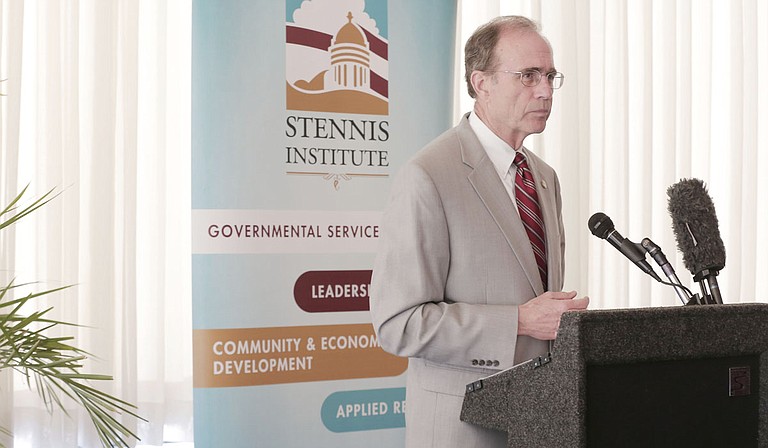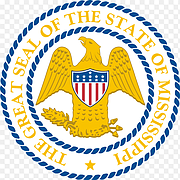Secretary of State Delbert Hosemann formed a committee in 2015 to work on election-reform measures he will present to the Legislature in the current session. Photo by Imani Khayyam.
Wednesday, February 3, 2016
Election-law reform has been a slow process in Mississippi, but with the help of a bi-partisan committee's report, that could change soon. Secretary of State Delbert Hosemann formed a committee of legislators, circuit clerks, election commissioners and other citizens to review the state's election code. The 2016 Election Law Reform Committee met from June through September 2015 and published a report of their recommendations on Jan. 19.
The committee suggests several changes to Mississippi's election code, including online voter registration, campaign-finance reporting and election official conduct. Hosemann views the changes as "phase two" of election-law reform that he says started with the voter-ID laws that went into effect in 2014. Hosemann told the Stennis Press Forum on Feb. 1 that the committee looked at several other state election laws to help inform their recommendations.
The secretary of state's office will lobby for the 380-page bill to be passed in the 2016 legislative session. Hosemann said the committee's report was an indicator of the progress Mississippi has made in election laws.
"I think it's well worth our efforts ...," Hosemann said Monday. "All of these changes are big parts of an interwoven election code that should be passed."
Hosemann said the entire bill should be passed together because all the changes affect the election system as a whole.
The committee recommends tightening up campaign-finance laws by holding political committees to stricter reporting deadlines. Instead of the 10-day reporting period after spending or receiving more than $200, the proposal says committees must report within 48 hours.
Additionally, expenses should be line-itemized. The goal of these changes is transparency, the report says.
The Push to Register Online
The committee's report recommends that Mississippi join 26 other states in the country that allow users to register to vote online. Sen. David Blount, D-Jackson, has worked on online voter-registration bills for the past two years. In 2014, his bill did not make it out of committee, and last year it didn't pass.
This year, however, Blount plans to introduce a similar bill—and this time, with a growing bi-partisan consensus, believes it has a better chance.
"My belief is that the more people who vote, the better," Blount said. "(But) if there's one topic that everyone in the Legislature is an expert in, that's getting elected, so election bills can be challenging."
The report asks the secretary of state to work with the Mississippi Department of Public Safety to create a secure website where a person could register as a first-time voter or change his or her voter-registration record online. A person would need a valid form of DPS-issued identification to register online.
Registering to vote online is so common that Facebook is using a promotional banner in the upcoming federal elections to encourage users to register to vote.
On Jan. 29, voting-aged Mississippi Facebook users received reminders to register to vote. The link took users to vote.usa.gov. Mississippi's link on that page led to the secretary of state's website that informs users how and where to register in person because Mississippians cannot yet register online.
In a statement from Facebook, the company said: "Voter registration remains a big hurdle to people participating in elections. By reminding people to register to vote, we hope we can encourage people to become more civically engaged."
First Amendment scholar and law professor Matt Steffey says that the trend has been to make voting easier, and our laws are lagging.
"The idea of a working democracy is to encourage voting, and it's not clear to me why you wouldn't want to reach as many people as possible," Steffey said.
Online voter registration would likely encourage more engagement in the political process across the board, Steffey said, and any fears of it creating voter-fraud issues on voting day are likely unfounded.
"Voter fraud is like global-warming denial—it's a political issue only," Steffey said. "There's virtual unanimity among ... political scientists that voter fraud is not a significant issue."
Straw Drawing In; 30-Day Limit Out
The part of Mississippi's election code that the majority of the special election committee relied upon to unseat Bo Eaton this session would be changed if the committee's report is made into law. The Mississippi House of Representatives voted to unseat Eaton because the committee determined that five of the affidavit ballots violated a part of Mississippi's election code that says a person must register to vote within 30 days of moving from one voting precinct to another.
The report suggests that a person can transfer voter registration up until the date that his or her county prepares poll books for the election.
Hosemann confirmed this part of the proposed bill on Monday. "We changed the law," Hosemann said. "The new bill will allow you that the fact that you don't give notice does not cancel your ballot."
Of course, these changes are coming at a time too late for Eaton to reap their advantages—in fact, the Legislature has to approve the proposed changes.
Six lawmakers were on the committee that helped write the report, including Rep. Bill Denny, R-Jackson, who served on the special election committee that drafted the report to unseat Eaton.
Blount said he plans to propose the online voter registration and pre-Election Day voting bills to the Senate.
Most changes to election laws would likely not take effect until 2017 unless the Legislature decides to move at lightning speed. If the Mississippi House of Representatives is any indicator of the speedometer this session, that won't be very fast.
Email legislative reporter Arielle Dreher at [email protected]. For more legislative coverage, visit jfp.ms/msleg. Read the 2016 Election Law Reform Committee report at jfp.ms/documents.
Proposed Revisions to Mississippi Election Laws
Modernized Criminal Penalties: Consolidates election crimes, updates penalties to match fines and sentences applied to other felonies and misdemeanors.
Online Voter Registration: Modernizes Mississippi's voter-registration system, will allow U.S. citizens with Mississippi driver's licenses or DPS-issued I.D. cards to register online.
Pre-Election Day Voting: Creates a 21-day no-excuse voting period for citizens to cast votes before Election Day in county courthouses only, eliminates need for in-person absentee voting.
Financial Disclosures to Voters: Moves deadlines for political committees to file a statements to within 48 hours after spending or receiving funds, increases transparency by requiring filers to itemize payments made to credit-card issuers, banks or online portals.
Presidential Primary: Moves Mississippi's presidential preference primary from the second Tuesday in March to the first Tuesday.
All information from the Secretary of State's office's proposed revisions to Mississippi's election laws—note that these are proposed changes, not yet in effect.


Comments
Use the comment form below to begin a discussion about this content.
Sign in to comment
Or login with:
OpenID